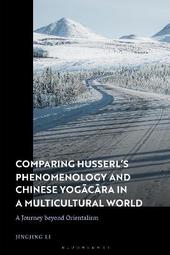
|
Comparing Husserl's Phenomenology and Chinese Yogacara in a Multicultural World: A Journey Beyond Orientalism
Hardback
Main Details
| Title |
Comparing Husserl's Phenomenology and Chinese Yogacara in a Multicultural World: A Journey Beyond Orientalism
|
| Authors and Contributors |
By (author) Dr Jingjing Li
|
| Physical Properties |
| Format:Hardback | | Pages:272 | | Dimensions(mm): Height 234,Width 156 |
|
| Category/Genre | Phenomenology and Existentialism
Non-western philosophy
Buddhism |
|---|
| ISBN/Barcode |
9781350256903
|
| Classifications | Dewey:111.1 |
|---|
| Audience | | Professional & Vocational | |
|---|
|
Publishing Details |
| Publisher |
Bloomsbury Publishing PLC
|
| Imprint |
Bloomsbury Academic
|
| Publication Date |
5 May 2022 |
| Publication Country |
United Kingdom
|
Description
While phenomenology and Yogacara Buddhism are both known for their investigations of consciousness, there exists a core tension between them: phenomenology affirms the existence of essence, whereas Yogacara Buddhism argues that everything is empty of essence (svabhava). How is constructive cultural exchange possible when traditions hold such contradictory views? Answering this question and positioning both philosophical traditions in their respective intellectual and linguistic contexts, Jingjing Li argues that what Edmund Husserl means by essence differs from what Chinese Yogacarins mean by svabhava, partly because Husserl problematises the substantialist understanding of essence in European philosophy. Furthermore, she reveals that Chinese Yogacara has developed an account of self-transformation, ethics and social ontology that renders it much more than simply a Buddhist version of Husserlian phenomenology. Detailing the process of finding a middle ground between the two traditions, this book demonstrates how both can thrive together in order to overcome Orientalism.
Author Biography
Jingjing Li is Assistant Professor of Chinese and Comparative Philosophy at the Institute for Philosophy at Leiden University, the Netherlands.
ReviewsThis book is an impressive and ambitious piece of scholarship in the field of intercultural comparative philosophy. Through the central problem of essence and the organizational metaphor of a journey, Jingjing Li engages two forms of phenomenology formulated by Husserl and Chinese Yogacara Buddhists, both of which are immensely complex. Li skillfully maintains the distinctiveness of the two philosophical projects in their own contexts while revealing their shared visions about the human mind in the course of her intercultural investigation. The book is methodologically sophisticated and philosophically substantive. It is a major contribution to the comparative study of Husserlian phenomenology and Yogacara Buddhist philosophy. * Tao Jiang, Chair of Religion Department and Director of Center for Chinese Studies, Rutgers University, USA *
|